何江在哈佛大学2016毕业典礼上的演讲(中英版个人简介) (1)
中国学生哈佛演讲内容
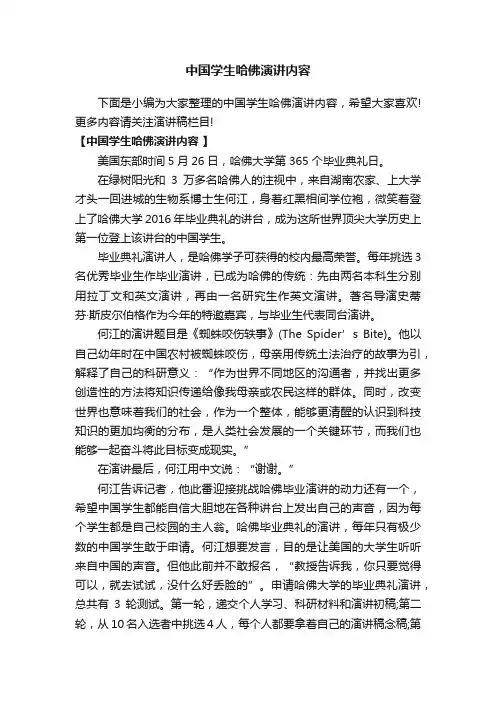
中国学生哈佛演讲内容下面是小编为大家整理的中国学生哈佛演讲内容,希望大家喜欢!更多内容请关注演讲稿栏目!【中国学生哈佛演讲内容】美国东部时间5月26日,哈佛大学第365个毕业典礼日。
在绿树阳光和3万多名哈佛人的注视中,来自湖南农家、上大学才头一回进城的生物系博士生何江,身着红黑相间学位袍,微笑着登上了哈佛大学2016年毕业典礼的讲台,成为这所世界顶尖大学历史上第一位登上该讲台的中国学生。
毕业典礼演讲人,是哈佛学子可获得的校内最高荣誉。
每年挑选3名优秀毕业生作毕业演讲,已成为哈佛的传统:先由两名本科生分别用拉丁文和英文演讲,再由一名研究生作英文演讲。
著名导演史蒂芬·斯皮尔伯格作为今年的特邀嘉宾,与毕业生代表同台演讲。
何江的演讲题目是《蜘蛛咬伤轶事》(The Spider’s Bite)。
他以自己幼年时在中国农村被蜘蛛咬伤,母亲用传统土法治疗的故事为引,解释了自己的科研意义:“作为世界不同地区的沟通者,并找出更多创造性的方法将知识传递给像我母亲或农民这样的群体。
同时,改变世界也意味着我们的社会,作为一个整体,能够更清醒的认识到科技知识的更加均衡的分布,是人类社会发展的一个关键环节,而我们也能够一起奋斗将此目标变成现实。
”在演讲最后,何江用中文说:“谢谢。
”何江告诉记者,他此番迎接挑战哈佛毕业演讲的动力还有一个,希望中国学生都能自信大胆地在各种讲台上发出自己的声音,因为每个学生都是自己校园的主人翁。
哈佛毕业典礼的演讲,每年只有极少数的中国学生敢于申请。
何江想要发言,目的是让美国的大学生听听来自中国的声音。
但他此前并不敢报名,“教授告诉我,你只要觉得可以,就去试试,没什么好丢脸的”。
申请哈佛大学的毕业典礼演讲,总共有3轮测试。
第一轮,递交个人学习、科研材料和演讲初稿;第二轮,从10名入选者中挑选4人,每个人都要拿着自己的演讲稿念稿;第三轮,从4人中选出1人,所有人都被要求脱稿模拟演讲。
何江做到了,哈佛校园回荡的掌声为证。
何江:站上哈佛大学演讲台的中国农村伢子
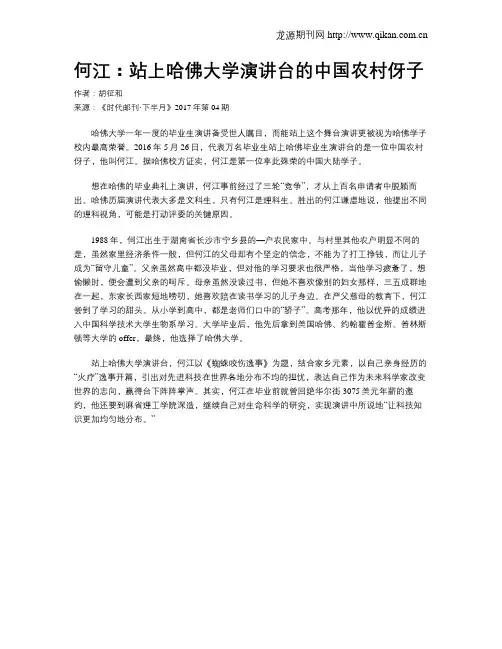
龙源期刊网 何江:站上哈佛大学演讲台的中国农村伢子作者:胡征和来源:《时代邮刊·下半月》2017年第04期哈佛大学一年一度的毕业生演讲备受世人瞩目,而能站上这个舞台演讲更被视为哈佛学子校内最高荣誉。
2016年5月26日,代表万名毕业生站上哈佛毕业生演讲台的是一位中国农村伢子,他叫何江。
据哈佛校方证实,何江是第一位享此殊荣的中国大陆学子。
想在哈佛的毕业典礼上演讲,何江事前经过了三轮“竞争”,才从上百名申请者中脱颖而出。
哈佛历届演讲代表大多是文科生,只有何江是理科生。
胜出的何江谦虚地说,他提出不同的理科视角,可能是打动评委的关键原因。
1988年,伺江出生于湖南省长沙市宁乡县的—户农民家中。
与村里其他农户明显不同的是,虽然家里经济条件一般,但何江的父母却有个坚定的信念,不能为了打工挣钱,而让儿子成为“留守儿童”。
父亲虽然高中都没毕业,但对他的学习要求也很严格,当他学习疲惫了,想偷懒时,便会遭到父亲的呵斥。
母亲虽然没读过书,但她不喜欢像别的妇女那样,三五成群地在一起,东家长西家短地唠叨,她喜欢陪在读书学习的儿子身边。
在严父慈母的教育下,何江尝到了学习的甜头。
从小学到高中,都是老师们口中的“骄子”。
高考那年,他以优异的成绩进入中国科学技术大学生物系学习。
大学毕业后,他先后拿到美国哈佛、约翰霍普金斯、普林斯顿等大学的offer,最终,他选择了哈佛大学。
站上哈佛大学演讲台,何江以《蜘蛛咬伤逸事》为题,结合家乡元素,以自己亲身经历的“火疗”逸事开篇,引出对先进科技在世界各地分布不均的担忧,表达自己作为未来科学家改变世界的志向,赢得台下阵阵掌声。
其实,何江在毕业前就曾回绝华尔街3075美元年薪的邀约,他还要到麻省理工学院深造,继续自己对生命科学的研究,实现演讲中所说地“让科技知识更加均匀地分布。
”。
何江——从湖南农村到哈佛毕业典礼演讲台
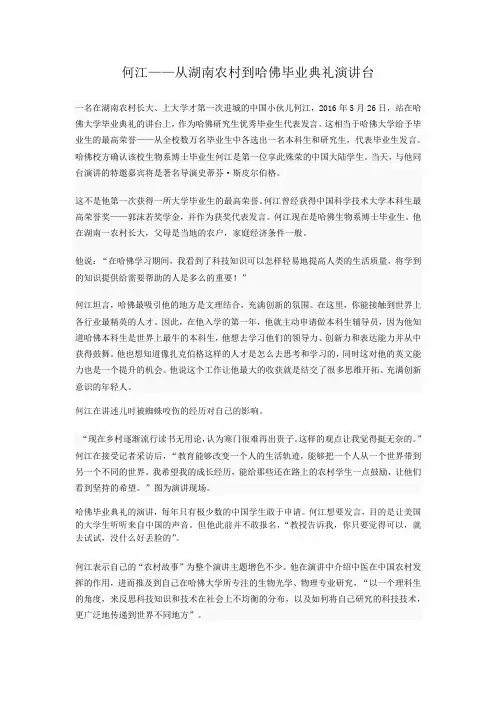
何江——从湖南农村到哈佛毕业典礼演讲台一名在湖南农村长大、上大学才第一次进城的中国小伙儿何江,2016年5月26日,站在哈佛大学毕业典礼的讲台上,作为哈佛研究生优秀毕业生代表发言。
这相当于哈佛大学给予毕业生的最高荣誉——从全校数万名毕业生中各选出一名本科生和研究生,代表毕业生发言。
哈佛校方确认该校生物系博士毕业生何江是第一位享此殊荣的中国大陆学生。
当天,与他同台演讲的特邀嘉宾将是著名导演史蒂芬·斯皮尔伯格。
这不是他第一次获得一所大学毕业生的最高荣誉。
何江曾经获得中国科学技术大学本科生最高荣誉奖——郭沫若奖学金,并作为获奖代表发言。
何江现在是哈佛生物系博士毕业生。
他在湖南一农村长大,父母是当地的农户,家庭经济条件一般。
他说:“在哈佛学习期间,我看到了科技知识可以怎样轻易地提高人类的生活质量,将学到的知识提供给需要帮助的人是多么的重要!”何江坦言,哈佛最吸引他的地方是文理结合,充满创新的氛围。
在这里,你能接触到世界上各行业最精英的人才。
因此,在他入学的第一年,他就主动申请做本科生辅导员,因为他知道哈佛本科生是世界上最牛的本科生,他想去学习他们的领导力、创新力和表达能力并从中获得鼓舞。
他也想知道像扎克伯格这样的人才是怎么去思考和学习的,同时这对他的英文能力也是一个提升的机会。
他说这个工作让他最大的收获就是结交了很多思维开拓、充满创新意识的年轻人。
何江在讲述儿时被蜘蛛咬伤的经历对自己的影响。
“现在乡村逐渐流行读书无用论,认为寒门很难再出贵子。
这样的观点让我觉得挺无奈的。
”何江在接受记者采访后,“教育能够改变一个人的生活轨迹,能够把一个人从一个世界带到另一个不同的世界。
我希望我的成长经历,能给那些还在路上的农村学生一点鼓励,让他们看到坚持的希望。
”图为演讲现场。
哈佛毕业典礼的演讲,每年只有极少数的中国学生敢于申请。
何江想要发言,目的是让美国的大学生听听来自中国的声音。
但他此前并不敢报名,“教授告诉我,你只要觉得可以,就去试试,没什么好丢脸的”。
【优质文档】何江哈佛演讲稿-推荐word版 (9页)
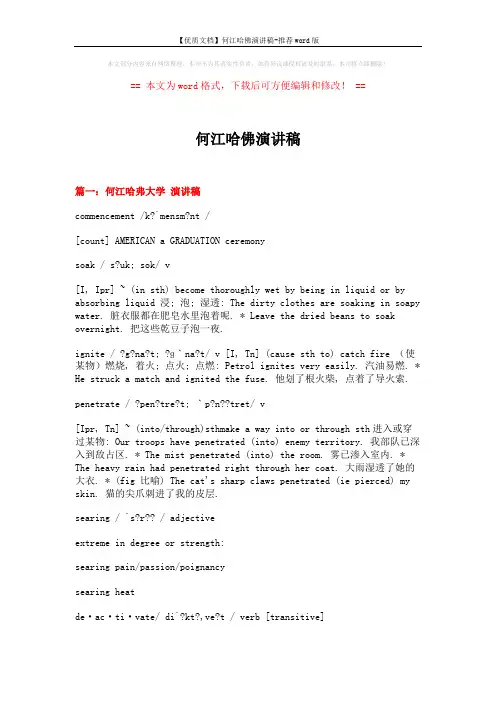
本文部分内容来自网络整理,本司不为其真实性负责,如有异议或侵权请及时联系,本司将立即删除!== 本文为word格式,下载后可方便编辑和修改! ==何江哈佛演讲稿篇一:何江哈弗大学演讲稿commencement /k?`mensm?nt /[count] AMERICAN a GRADUATION ceremonysoak / s?uk; sok/ v[I, Ipr] ~ (in sth) become thoroughly wet by being in liquid or by absorbing liquid 浸; 泡; 湿透: The dirty clothes are soaking in soapy water. 脏衣服都在肥皂水里泡着呢. * Leave the dried beans to soak overnight. 把这些乾豆子泡一夜.ignite / ?g?na?t; ?ɡˋna?t/ v [I, Tn] (cause sth to) catch fire (使某物)燃烧, 着火; 点火; 点燃: Petrol ignites very easily. 汽油易燃. * He struck a match and ignited the fuse. 他划了根火柴, 点着了导火索.penetrate / ?pen?tre?t; ˋp?n??tret/ v[Ipr, Tn] ~ (into/through)sthmake a way into or through sth进入或穿过某物: Our troops have penetrated (into) enemy territory. 我部队已深入到敌占区. * The mist penetrated (into) the room. 雾已渗入室内. * The heavy rain had penetrated right through her coat. 大雨湿透了她的大衣. * (fig 比喻) The cat's sharp claws penetrated (ie pierced) my skin. 猫的尖爪刺进了我的皮层.searing / `s?r?? / adjectiveextreme in degree or strength:searing pain/passion/poignancysearing heatde·ac·ti·vate/ di`?kt?,ve?t / verb [transitive]to prevent something such as a bomb or an ALARM from being able to workven·om/ `ven?m / noun [uncount]poison produced by some animals, especially snakes and insectsrem·e·dy1 / `rem?di / noun [count] **a cure for pain or a minor illness:herbal remediesincorporate/ ?n?k??p?re?t; ?nˋk?rp?ret/ v[Tn, Tn.pr] ~ sth (in/into sth) make sth part of a whole; include 将某事物包括进去; 包含: Many of your suggestions have been incorporated in the new plan. 你的建议多已纳入新计画中linger / ?l??g?(r); ˋl??ɡ?/ v [I, Ipr, Ip]stay for a long time; be unwilling to leave 逗留; 徘徊: She lingered after the concert, hoping to meet the star. 音乐会後她徘徊不去, 希望能一见明星.manipu late / m??n?pjule?t; m?ˋn?pj??let/ v [Tn]control or handle (sth) with skill 熟练控制或操纵(某事物): manipulate the gears and levers of a machine 熟练操纵机器的排挡和变速杆 * Primitive man quickly learned how to manipulate tools. 原始人很快学会了使用工具.neural / ?nju?r?l; ˋnj?r?l/ adj(ana tomy 解) of the nerves 神经的.amass / ??m?s; ?ˋm?s/ v [Tn]gather together or collect (sth), esp in large quantities (尤指大量地)积累, 积聚, 收集(某事物): amass a fortune 积累财富afflict / ??fl?kt; ?ˋfl?kt/ v [usu passive 通常用於被动语态: Tn, Tn.pr] ~ sb/sth (with sth) cause trouble, pain or distress to sb/sth 使某人[某物]苦恼﹑疼痛或悲痛: She is afflicted with (ie suffers from) arthritis. 她患关节炎.impede / ?m?pi?d; ?mˋpid/ v [Tn] hinder or obstruct the progress or movement of (sb/sth) 阻碍, 妨碍, 阻止(某人[某事物]): The development of the project was seriouslyimpeded by a reduction in funds. 由於基金削减工程进度严重受阻.profound / pr??faund; pr?ˋfa?nd/ adj[usuattrib通常作定语] (fml文) deep, intense or far-reaching; verygreat深的; 深切的; 深远的; 极度的; 极大的: a profoundsigh, silence, sleep, shock 一声长叹﹑一片死寂﹑一阵酣睡﹑一次沉重的打击 * take a profound interest in sth对某事物产生极大的兴趣 pandemic /p?n?dem?k; p?nˋd?m?k/ n, adjdisease occurring over a whole country or the whole world 全国或全世界流行的(疾病).demon / ?di?m?n; ˋdim?n/ nwicked or cruel spirit 恶魔; 魔鬼: medieval carvings of demons中世纪的魔鬼雕像. lethal / ?li?θl; ˋliθ?l/ adjcausing or able to cause death 致死的; 能致命的: a lethal dose of poison 毒药的致命剂量 * lethal weapons致命武器.budding / `b?d?? / adjective [only before noun]at the very beginning of a career in writing, acting, politics, etc. and likely to be successful at it:emphasizeem·pha·size/ `emf?,sa?z / verb [transitive]to give particular importance or attention to something:At school they emphasize good manners.pivotal / `p?v?tl / adjectiveextremely important and affecting how something develops:a pivotal moment in the history of the Egyptian stateHe played a pivotal role in the negotiations.a pivotal figure/player in U.S. politicsHe Jiang’s Harvard University 201X Commencement Address。
何江在哈佛大学2016毕业典礼上的演讲(中英版+个人简介)
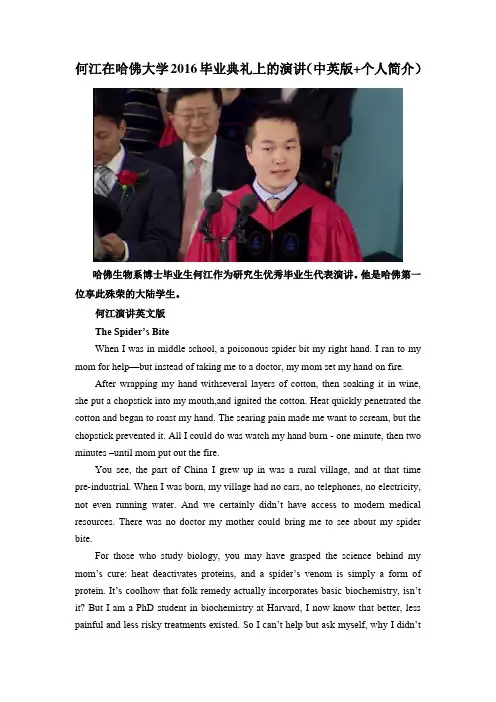
何江在哈佛大学2016毕业典礼上的演讲(中英版+个人简介)哈佛生物系博士毕业生何江作为研究生优秀毕业生代表演讲。
他是哈佛第一位享此殊荣的大陆学生。
何江演讲英文版The Spider’s BiteWhen I was in middle school, a poisonous spider bit my right hand. I ran to my mom for help—but instead of taking me to a doctor, my mom set my hand on fire.After wrapping my hand withseveral layers of cotton, then soaking it in wine, she put a chopstick into my mouth,and ignited the cotton. Heat quickly penetrated the cotton and began to roast my hand. The searing pain made me want to scream, but the chopstick prevented it. All I could do was watch my hand burn - one minute, then two minutes –until mom put out the fire.You see, the part of China I grew up in was a rural village, and at that time pre-industrial. When I was born, my village had no cars, no telephones, no electricity, not even running water. And we certainly didn’t have access to modern medical resources. There was no doctor my mother could bring me to see about my spider bite.For those who study biology, you may have grasped the science behind my mom’s cure: heat deactivates proteins, and a spider’s venom is simply a form of protein. It’s coolhow that folk remedy actually incorporates basic biochemistry, isn’t it? But I am a PhD student in biochemistry at Harvard, I now know that better, less painful and less risky treatments existed. So I can’t help but ask myself, why I didn’treceive oneat the time?Fifteen years have passed since that incident. I am happy to report that my hand is fine. But this question lingers, and I continue to be troubled by the unequal distribution of scientific knowledge throughout the world. We have learned to edit the human genome and unlock many secrets of how cancer progresses. We can manipulate neuronal activity literally with the switch of a light. Each year brings more advances in biomedical research-exciting, transformative accomplishments. Yet, despite the knowledge we have amassed, we haven’t been so successful in deploying it to where it’s needed most. According to the World Bank, twelve percent of the world’s population lives on less than $2 a day. Malnutrition kills more than 3 million children annually. Three hundred million peopleare afflicted by malaria globally. All over the world, we constantly see these problems of poverty, illness, and lack of resources impeding the flow of scientific information. Lifesaving knowledge we take for granted in the modern world is often unavailable in these underdeveloped regions.And in far too many places, people are still essentially trying to cure a spider bite with fire.While studying at Harvard, I saw how scientific knowledge can help others in simple, yet profound ways. The bird flu pandemic in the 2000s looked to my village like a spell cast by demons. Our folk medicine didn’t even have half-measures to offer. What’s more, farmers didn’t know the difference between common cold and flu; they didn’t understand that the flu was much more lethal than the common cold. Most people were also unaware that the virus could transmit across different species.So when I realized that simple hygiene practices like separating different animal species could contain the spread of the disease, and that I could help make this knowledge available to my village, that was my first “Aha” moment as a budding scientist. But it was more than that: it was also a vital inflection point in my own ethical development, my own self-understanding as a member of the global community.Harvard dares us to dream big, to aspire to change the world. Here on this Commencement Day, we are probably thinking of grand destinations and big adventures that await us. As for me, I am also thinking of the farmers in my village. My experiencehere reminds me how important it is for researchersto communicateour knowledge to those who need it. Because by using the sciencewe already have, wecould probably bring my village and thousands like it into the world you and I take for granted every day. And that’s an impact every one of us can make!But the question is, will we make the effort or not?More than ever before,our society emphasizes science and innovation. But an equally important emphasis should be on distributing the knowledge we have to where it’s needed. Changing the world doesn’t mean thateveryone has to find the next big thing. It can be as simple as becoming better communicators, and finding more creative ways to pass on the knowledge we have to people like my mom and the farmers in their local community. Our society also needs to recognize that the equal distribution of knowledge is a pivotal step of human development, and work to bring this into reality.And if we do that, then perhaps a teenager in rural China who is bitten by a spider will not have to burn his hand, but will know to seek a doctor instead.在我读初中的时候,有一次,一只毒蜘蛛咬伤了我的右手。
JK罗琳哈佛大学毕业典礼上的演讲:中英对照
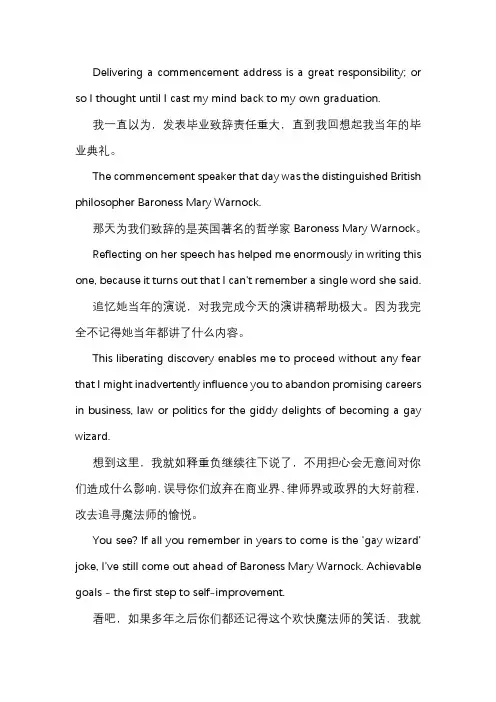
Delivering a commencement address is a great responsibility; or so I thought until I cast my mind back to my own graduation.我一直以为,发表毕业致辞责任重大,直到我回想起我当年的毕业典礼。
The commencement speaker that day was the distinguished British philosopher Baroness Mary Warnock.那天为我们致辞的是英国著名的哲学家Baroness Mary Warnock。
Reflecting on her speech has helped me enormously in writing this one, because it turns out that I can't remember a single word she said.追忆她当年的演说,对我完成今天的演讲稿帮助极大。
因为我完全不记得她当年都讲了什么内容。
This liberating discovery enables me to proceed without any fear that I might inadvertently influence you to abandon promising careers in business, law or politics for the giddy delights of becoming a gay wizard.想到这里,我就如释重负继续往下说了,不用担心会无意间对你们造成什么影响,误导你们放弃在商业界、律师界或政界的大好前程,改去追寻魔法师的愉悦。
You see? If all you remember in years to come is the 'gay wizard' joke, I've still come out ahead of Baroness Mary Warnock. Achievable goals - the first step to self-improvement.看吧,如果多年之后你们都还记得这个欢快魔法师的笑话,我就超越了Warnock。
何江:哈佛毕业典礼演讲台上的湖南伢子
何江:哈佛毕业典礼演讲台上的湖南伢子作者:暂无来源:《发明与创新·大科技》 2016年第8期文/刘爱华“当我能将这些知识传递到我的村庄并为它的建设贡献力量时,我的内心第一次有了一种作为未来科学家的使命感。
”前不久,哈佛大学2016年毕业典礼上,来自中国的学生何江作为优秀毕业生代表之一登上毕业典礼演讲台,讲述中国故事。
而这相当于哈佛大学给予毕业生的最高荣誉,何江成为第一位享此殊荣的中国大陆学生,与他同台演讲的还有著名导演史蒂芬·斯皮尔伯格。
七年前,刚刚大学毕业的何江带着象征中国科学技术大学学生最高荣誉——“郭沫若奖学金”的光环,来到哈佛大学继续深造。
初到哈佛的何江发现,校园里经常能偶遇一些诺贝尔奖得主、学术“大咖”,而这些耳熟能详的名字原来都是在教科书里才能看到的。
随着留学生活的展开,在课堂上、讲座中,何江发现学生可以大胆地对“大咖”们的观点提出质疑,相互讨论,还能与他们相约一起啃汉堡、喝咖啡、泡酒吧,谈论学术问题,时不时地还会受到他们的鼓励。
在这样的环境中,学生成长得很快,也变得非常自信。
正是在一位教授的鼓励下,何江决定申请毕业演讲的资格。
经过精心准备,何江一路过关斩将,从全校数万名毕业生中脱颖而出。
申请哈佛大学毕业典礼演讲的程序很严格,要通过3轮测试。
第一轮是递交个人材料和演讲初稿;第二轮是从12名入选者中挑选4人,申请者可以对着演讲稿念稿;第三轮是从4人中选出1人,进行脱稿模拟演讲。
最终,校方从申请者中各选出一名本科生和一名研究生。
何江的准备很充分,从题材到具体内容都细细打磨,加上多年苦练的流利口语,他顺利入选。
在哈佛毕业典礼的演讲台上,华人面孔很少,几乎被文科生占据的演讲舞台,理科生更是凤毛麟角。
何江的想法很简单,就是“想让美国大学生听听来自中国的声音”。
演讲中,何江从科技与知识在社会的不均衡分布入手,结合自己的成长经历,阐述了对于科技的思考。
“在未来,我相信会有更多的中国人在类似的舞台上发出中国声音。
高考语文 作文热点素材 中国留学生首登哈佛大学毕业典礼演讲台
中国留学生首登哈佛大学毕业典礼演讲台【素材回放】2016年5月26日上午,哈佛的毕业典礼在“三百周年”剧场举行(Tercentenary Theatre),何江以及另外两名哈佛毕业生,面对约3万参加典礼的学生、家长以及教师,发表了毕业演讲。
据哈佛校报报道,何江在毕业典礼前表示,自己在中国湖南省长大,他的家庭很贫穷,也没有什么现代科技。
何江说:“我出生长大的那个小村庄,直到1990年才通了电,2001年才有了第一部电话,平常我们都是使用煤油灯,喝水都是从井里打。
那里的教育资源十分匮乏。
那里的师资和城市里比也比较差。
除了教科书之外,那里的孩子几乎读不到其他书籍。
”何江回忆起自己2005年首次从小山村到大城市读大学的场景时说:“我那个时候还不知道怎么用电脑。
”何江在安徽合肥的中国科技技术大学读本科,那时每个大学新生都要求上电脑编程课。
何江回忆说,那是一场痛苦但是值得回忆的经历。
这不是何江第一次获得一所大学毕业生的最高荣誉。
何江曾经获得中国科学技术大学本科生最高荣誉奖——郭沫若奖学金,并作为获奖代表发言。
据悉,哈佛毕业典礼的历届演讲代表多为文科生,何江是为数不多的一名理科生代表。
哈佛博士毕业后,何江将赴麻省理工学院进行博士后研究。
何江在演讲中介绍了中医在中国农村发挥的作用,进而推及到自己在哈佛大学所专注的生物光学、物理专业研究,“以一个理科生的角度,来反思科技知识和技术在社会上不均衡的分布,以及如何将自己研究的科技技术,更广泛地传递到世界不同地方”。
【素材解读】他的人生经历,给年轻人,特别是正在受着“读书无用”和“寒门再难出贵子”言论困扰的乡村年轻人,怎样的激励!明眼人都知道,那不仅仅是一种“论”,而是许多人难以挣脱的现实处境。
何江的人生故事,会为一些感觉前路渺茫的年轻人的心中,撒下一些希望的火种!当然,仅有希望的火种还是不够的,环境和硬件是更重要的。
没有硬件支持的希望,出身寒门的何江会像某些不幸的孩子那样,望着大学校门兴叹。
哈佛毕业典礼登台演讲的首位华人学子
哈佛毕业典礼登台演讲的首位华人学子哈佛毕业典礼登台演讲的首位华人学子导读:5月26日,哈佛大学第365届毕业典礼举行,湖南小伙何江作为优秀毕业生代表发表演讲,这是哈佛大学给予毕业生的最高荣誉。
15年前被毒蜘蛛咬伤后的火疗方法,何江一直都记得。
先是手上包好几层棉花,再喷上白酒,母亲打火点燃了棉花,热量逐渐炙烤。
疼。
但嘴里咬着一双筷子,叫不出。
5月26日,这位哈佛史上首位登上毕业典礼演讲台的中国大陆学生,把这个故事,作为他演讲的开头。
与他同台演讲的,还有斯皮尔伯格。
这位从宁乡县农村走出的学子,没有任何起跑优势,却一路“开挂”,从中国科技大学毕业后,赴哈佛大学研读生物化学,硕博连读,如今将赴麻省理工学院进行博士后研究,主攻生物领域。
这一次,作为一个从小性格腼腆内敛的男孩,站上世界一流大学演讲台、面对3万多人演讲,也是何江自己对自己的一次“叫板”。
他的演讲改变世界,是“将知识分配到真正需要的地方”当地时间5月26日,哈佛大学第365届毕业典礼现场。
何江以及其他两名优秀毕业生代表发言。
这是哈佛大学给予毕业生的最高荣誉,他也是首位登上毕业典礼演讲台的中国大陆学生。
身穿大红色毕业礼服的何江,站在舞台中央,面对台下3万多人演讲。
“非常紧张!”演讲前一天,电话里,何江坦承。
不过,演讲当天,何江一口美式英语,自信满满。
坐在他右手边,离他不足一米的斯皮尔伯格,戴着黑色边框眼镜,频频扭头看着他微笑。
他演讲的题目是《TheSpider’sBite》(《蜘蛛咬伤轶事》)。
演讲中,他提到了家乡,以前那个没有汽车,没有电话,也没有自来水的村庄。
因为没有合适的医生,母亲只能用火疗的方法治疗他被毒蜘蛛咬伤的手。
“于是我忍不住问自己,为什么我在当时没能享用到更为先进的治疗方法呢?”何江说。
15年过去,这个28岁、从世界一流大学毕业的何江,仍会时不时“因为先进科技知识在世界上不同地区的不平等分布而困扰”。
如今,他认为社会需要注意的一个重心是“分配知识到那些真正需要的地方”。
演讲稿 首位大陆毕业生何江哈佛中英文演讲稿
首位大陆毕业生何江哈佛中英文演讲稿何江哈佛毕业典礼中英文演讲稿The Spiders Bite蜘蛛咬伤轶事When I was in middle school, a poisonous spider bit my right hand. I ran to my mom for helpbut instead of taking me to a doctor, my mom set my hand on fire.在我读初中的时候,有一次,一只毒蜘蛛咬伤了我的右手。
我问我妈妈该怎么处理---我妈妈并没有带我去看医生,她而是决定用火疗的方法治疗我的伤口。
After wrapping my hand with several layers of cotton, then soaking it in wine, she put a chopstick into my mouth,and ignited the cotton. Heat quickly penetrated the cotton and began to roast my hand. The searing pain made me want to scream, but the chopstick prevented it. All I could do was watch my hand burn - one minute, then two minutes untilmom put out the fire.她在我的手上包了好几层棉花,棉花上喷撒了白酒,在我的嘴里放了一双筷子,然后打火点燃了棉花。
热量逐渐渗透过棉花,开始炙烤我的右手。
灼烧的疼痛让我忍不住想喊叫,可嘴里的筷子却让我发不出声来。
我只能看着我的手被火烧着,一分钟,两分钟,直到妈妈熄灭了火苗。
You see, the part of China I grew up in was a rural village, and at that time pre-industrial. When I was born, my village had no cars, no telephones, no electricity, not even running water. And we certainly didnt have access to modern medical resources. There was no doctor my mother could bring me to see about my spider bite.你看,我在中国的农村长大,在那个时候,我的村庄还是一个类似前工业时代的传统村落。
- 1、下载文档前请自行甄别文档内容的完整性,平台不提供额外的编辑、内容补充、找答案等附加服务。
- 2、"仅部分预览"的文档,不可在线预览部分如存在完整性等问题,可反馈申请退款(可完整预览的文档不适用该条件!)。
- 3、如文档侵犯您的权益,请联系客服反馈,我们会尽快为您处理(人工客服工作时间:9:00-18:30)。
何江在哈佛大学2016毕业典礼上的演讲(中英版+个人简介)哈佛生物系博士毕业生何江作为研究生优秀毕业生代表演讲。
他是哈佛第一位享此殊荣的大陆学生。
何江演讲英文版The Spider’s BiteWhen I was in middle school, a poisonous spider bit my right hand. I ran to my mom for help—but instead of taking me to a doctor, my mom set my hand on fire.After wrapping my hand withseveral layers of cotton, then soaking it in wine, she put a chopstick into my mouth,and ignited the cotton. Heat quickly penetrated the cotton and began to roast my hand. The searing pain made me want to scream, but the chopstick prevented it. All I could do was watch my hand burn - one minute, then two minutes –until mom put out the fire.You see, the part of China I grew up in was a rural village, and at that time pre-industrial. When I was born, my village had no cars, no telephones, no electricity, not even running water. And we certainly didn’t have access to modern medical resources. There was no doctor my mother could bring me to see about my spider bite.For those who study biology, you may have grasped the science behind my mom’s cure: heat deactivates proteins, and a spider’s venom is simply a form of protein. It’s coolhow that folk remedy actually incorporates basic biochemistry, isn’t it? But I am a PhD student in biochemistry at Harvard, I now know that better, less painful and less risky treatments existed. So I can’t help but ask myself, why I didn’treceive oneat the time?Fifteen years have passed since that incident. I am happy to report that my hand is fine. But this question lingers, and I continue to be troubled by the unequal distribution of scientific knowledge throughout the world. We have learned to edit the human genome and unlock many secrets of how cancer progresses. We can manipulate neuronal activity literally with the switch of a light. Each year brings more advances in biomedical research-exciting, transformative accomplishments. Yet, despite the knowledge we have amassed, we hav en’t been so successful in deploying it to where it’s needed most. According to the World Bank, twelve percent of the world’s population lives on less than $2 a day. Malnutrition kills more than 3 million children annually. Three hundred million peopleare afflicted by malaria globally. All over the world, we constantly see these problems of poverty, illness, and lack of resources impeding the flow of scientific information. Lifesaving knowledge we take for granted in the modern world is often unavailable in these underdeveloped regions.And in far too many places, people are still essentially trying to cure a spider bite with fire.While studying at Harvard, I saw how scientific knowledge can help others in simple, yet profound ways. The bird flu pandemic in the 2000s looked to my village like a spell cast by demons. Our folk medicine didn’t even have half-measures to offer. What’s more, farmers didn’t know the difference between common cold and flu; they didn’t understand that the flu was much more lethal t han the common cold. Most people were also unaware that the virus could transmit across different species.So when I realized that simple hygiene practices like separating different animal species could contain the spread of the disease, and that I could help make this knowledge available to my village, that was my first “Aha” moment as a budding scientist. But it was more than that: it was also a vital inflection point in my own ethical development, my own self-understanding as a member of the global community.Harvard dares us to dream big, to aspire to change the world. Here on this Commencement Day, we are probably thinking of grand destinations and big adventures that await us. As for me, I am also thinking of the farmers in my village. My experiencehere reminds me how important it is for researchersto communicateour knowledge to those who need it. Because by using the sciencewe already have, wecould probably bring my village and thousands like it into the world you and I take for granted every day. And that’s an impact every one of us can make!But the question is, will we make the effort or not?More than ever before,our society emphasizes science and innovation. But an equally important emphasis should be on distributing the knowledge we have to where it’s needed. Changing the world doesn’t mean thateveryone has to find the next big thing. It can be as simple as becoming better communicators, and finding more creative ways to pass on the knowledge we have to people like my mom and the farmers in their local community. Our society also needs to recognize that the equal distribution of knowledge is a pivotal step of human development, and work to bring this into reality.And if we do that, then perhaps a teenager in rural China who is bitten by a spider will not have to burn his hand, but will know to seek a doctor instead.在我读初中的时候,有一次,一只毒蜘蛛咬伤了我的右手。
